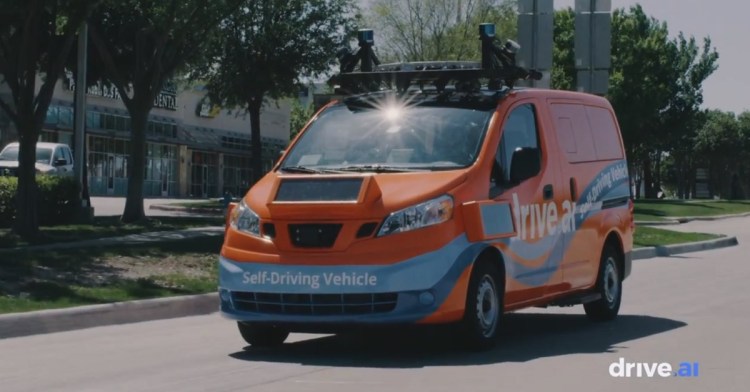Watch all the Transform 2020 sessions on-demand here.
Drive.ai announced a pilot program to bring on-demand self-driving car service to the Dallas suburb of Frisco, Texas, starting in July.
Working with the Frisco Transportation Management Association (TMA), Drive.ai will offer rides to over 10,000 people in self-driving vehicles within a geofenced area comprised of retail, entertainment, and office space.
The initial pilot will run for six months, beginning with fixed pickup and dropoff locations around Hall Park and The Star locations within the test area. The program marks the first time that Texans will have access to an on-demand self-driving car service on public roads.
The project is one of many that are underway, but it also happens amid controversies related the fatal pedestrian crash by a Uber self-driving car in Tempe, Arizona. Uber decided to put its testing on hold after the accident.
June 5th: The AI Audit in NYC
Join us next week in NYC to engage with top executive leaders, delving into strategies for auditing AI models to ensure fairness, optimal performance, and ethical compliance across diverse organizations. Secure your attendance for this exclusive invite-only event.
Leading up to the July launch date, office employees, residents, and patrons of these partners’ Frisco developments will gradually be added to the program, gaining access to Drive.ai’s ride-hailing smartphone app. Once the program is live, riders will use the app to hail complimentary on-demand rides in self-driving cars that connect to popular destinations in one of Frisco’s most lively areas.

Above: Drive.ai is a ride-hailing service that uses self-driving vehicles.
“Frisco is recognized as a leader in using ‘smart,’ innovative traffic technologies,” said Frisco Mayor Jeff Cheney, in a statement. “Drive.ai’s autonomous vehicles will help people get around one of our most vibrant, commercial areas along Frisco’s ‘North Platinum Corridor.’ We applaud the collaboration of the Denton County Transportation Authority, as well as our private partners at Hall Park, Frisco Station and The Star, which gave the green light, so to speak, to this pioneering pilot program. Today definitely marks a mobility milestone for our entire region. It also gets us closer to achieving one of our council’s ‘Top Ten’ goals, which is to improve traffic throughout Frisco, one of the fastest growing cities in the country.”
Drive.ai said it is working with cities and transit authorities to do self-driving services in a safe and measured way. Leading up to the July launch, Drive.ai will work with its partners to engage with members of the Frisco community, ensuring they are educated about and comfortable with the self-driving program. In addition, informational signage will be placed throughout the route, the vehicles will be painted a highly visible orange, and the cars will feature four external screens that communicate their intended actions to pedestrians and other drivers on the roads.
“Self-driving cars are here, and can improve the way we live right now,” said Sameep Tandon, CEO of Drive.ai, in a statement. “Our technology is safe, smart, and adaptive, and we are ready to work with governments and businesses to solve their transportation needs. Working with the City of Frisco and Frisco TMA, this pilot program will take people to the places they want to go and transform the way they experience transportation.”
As for safety, Drive.ai has taken a variety of steps to make its vehicles safer, according to Andrew Ng, a board member at Drive.ai. It has made its vehicles look distinctive, so people can recognize them quickly. Since the area where the vehicles travel is geofenced, Drive.ai knows what kinds of obstacles and risks exist there. It can also create designated pickup and dropoff zones to increase safety.
Founded in 2015 by graduate students out of Stanford University’s Artificial Intelligence Lab, Drive.ai has more than 100 employees, with locations in Mountain View, California and Frisco, Texas.


